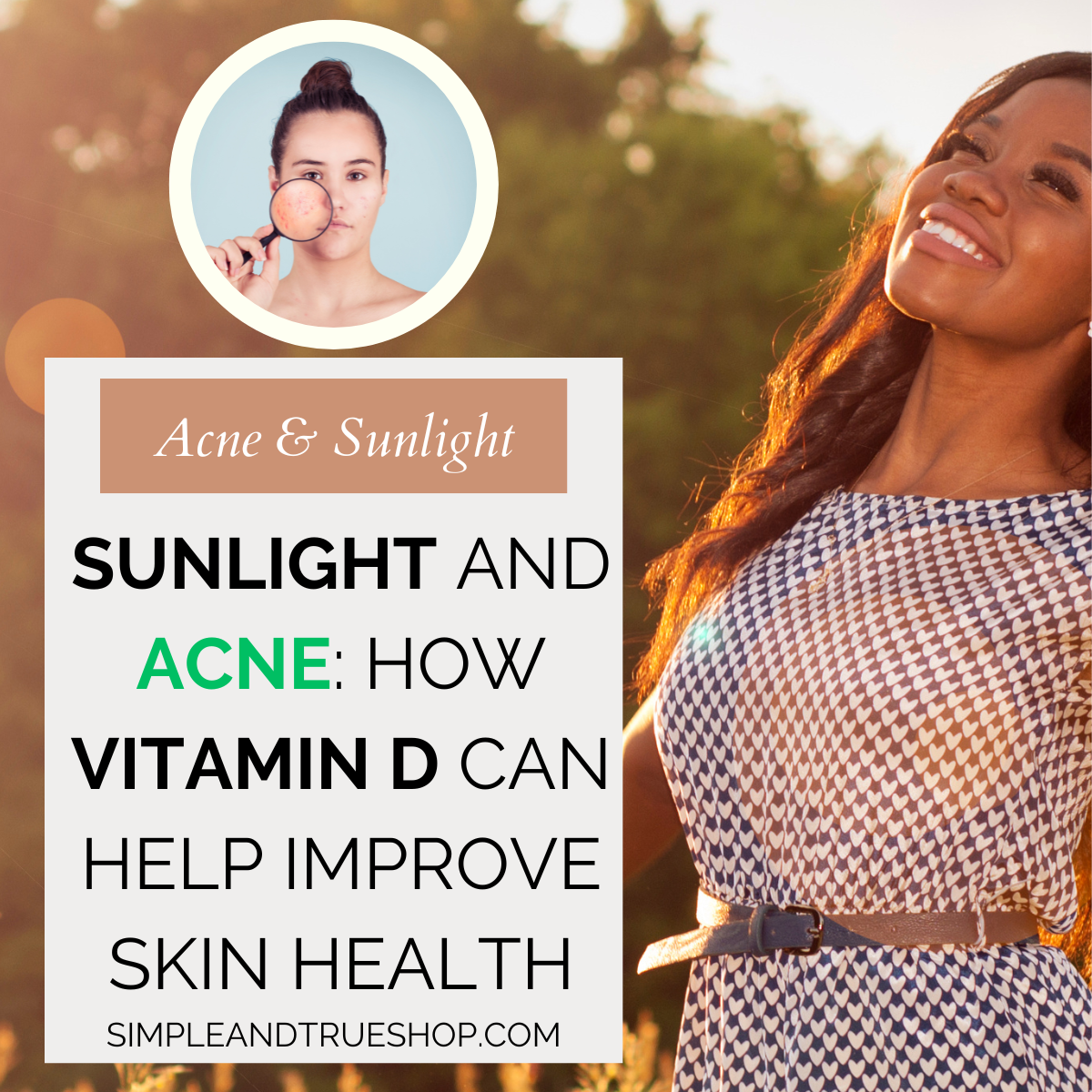Sunlight plays a vital role in our overall health, and moderate exposure to the sun can have a positive impact on skin health, especially for those dealing with acne. The primary benefit of sunlight is its ability to stimulate the production of Vitamin D in the body, a nutrient that is crucial for immune function, hormone regulation, and skin healing. In this chapter, we will explore the relationship between sunlight and acne, how to get safe sun exposure for skin healing, and the use of Vitamin D supplements, particularly in combination with Vitamin K2, for those with limited access to sunlight.

Sunlight and Acne: How Vitamin D Can Help Improve Skin Health
Sunlight has long been considered beneficial for skin conditions, and many people find that their acne improves with moderate sun exposure. There are a few key reasons why sunlight can help clear up acne:
- Vitamin D Production
When the skin is exposed to ultraviolet B (UVB) rays from the sun, it naturally synthesizes Vitamin D. This vitamin plays a crucial role in supporting the immune system and regulating inflammation. Studies have shown that individuals with acne often have lower levels of Vitamin D, and supplementing or increasing sun exposure can reduce the severity of acne symptoms. Vitamin D helps the body fight infections, including the bacteria that contribute to acne. It also supports the skin’s ability to heal and regenerate, making it a vital nutrient for overall skin health. - Antibacterial Properties of Sunlight
Sunlight has natural antibacterial effects, and moderate exposure to UV rays can help reduce the presence of acne-causing bacteria on the skin’s surface. UV radiation has been found to reduce the growth of Propionibacterium acnes (P. acnes), the bacteria responsible for acne. However, this effect is only beneficial with short bursts of sunlight, as prolonged exposure can lead to skin damage and increased inflammation. - Mood and Stress Reduction
In addition to its direct effects on the skin, sunlight boosts the production of serotonin, a hormone that helps improve mood and reduce stress. Since stress is a known trigger for acne, spending time in natural sunlight can help reduce stress-related breakouts. Lower stress levels also contribute to better hormone regulation, which is important for managing acne, especially in those with hormonal imbalances.
How to Safely Get Sunlight for Skin Healing
While sunlight offers benefits for the skin, it is crucial to balance exposure with protection to avoid the harmful effects of excessive UV radiation, such as sunburn, premature aging, and an increased risk of skin cancer. Here are some practical tips for safely getting the benefits of sunlight without damaging your skin:
- Limit Exposure to Safe Times
The sun’s UV rays are strongest between 10 a.m. and 4 p.m. To minimize the risk of skin damage, aim to get sun exposure in the early morning or late afternoon when the sun is less intense. Spending about 10–30 minutes in the sun a few times a week can be enough to boost Vitamin D levels without risking sunburn or long-term damage. - Protect Your Skin After Adequate Exposure
Once you’ve had enough sunlight for Vitamin D synthesis, protect your skin from overexposure. Apply a broad-spectrum sunscreen with an SPF of 30 or higher to shield your skin from harmful UV rays. Be sure to choose a non-comedogenic sunscreen that won’t clog your pores or aggravate acne. Wearing protective clothing, hats, and sunglasses can also help limit sun exposure while still allowing you to enjoy time outdoors. - Gradual Sun Exposure
If your skin is sensitive or you haven’t been exposed to sunlight for an extended period, gradually increase your time in the sun. Start with short periods of 5-10 minutes, and build up to 20-30 minutes. This slow progression will give your skin time to adjust while reducing the risk of sunburn or irritation. - Monitor Your Skin
While moderate sun exposure can be beneficial, it’s essential to pay attention to how your skin reacts. Some individuals with very sensitive or fair skin may experience irritation or exacerbation of acne due to sun exposure. If you notice any adverse effects, reduce the amount of time you spend in the sun and consult with a dermatologist for alternative options.
Vitamin D Supplements: Alternatives for Limited Sunlight Access
For individuals who live in areas with limited sunlight or those who are concerned about sun damage, Vitamin D supplements can be an excellent alternative for maintaining optimal skin health.
- Vitamin D3
When choosing a Vitamin D supplement, opt for Vitamin D3 (cholecalciferol), as it is the form that is most easily absorbed by the body. Studies have shown that supplementing with Vitamin D3 can improve acne symptoms, particularly in individuals who have a deficiency. It can help regulate immune function, reduce inflammation, and support the skin’s ability to heal. - Combining Vitamin D with Vitamin K2
When taking Vitamin D supplements, it’s important to also include Vitamin K2 in your regimen. Vitamin D increases calcium absorption in the body, but without adequate Vitamin K2, calcium can accumulate in the wrong places, such as blood vessels, leading to potential health issues. Vitamin K2 helps direct calcium to the bones, where it belongs, and away from the skin and other tissues. This synergy between Vitamin D and K2 ensures that your body gets the benefits of Vitamin D for your skin without risking calcium buildup in soft tissues. - Dosage and Safety
The recommended daily intake of Vitamin D varies depending on age, location, and individual health needs. For most adults, a daily supplement of 1,000 to 2,000 IU of Vitamin D3 is sufficient for maintaining optimal levels, particularly if you have limited sun exposure. However, it’s important to have your Vitamin D levels checked through a blood test to determine the correct dosage for your specific needs. Taking excessive amounts of Vitamin D can lead to toxicity, so always follow the guidance of a healthcare provider when supplementing.
Sunlight is a natural and powerful ally in maintaining clear, healthy skin. By providing your body with essential Vitamin D, moderate sun exposure supports your immune system, balances hormones, reduces inflammation, and promotes faster skin healing—all crucial factors in reducing acne. However, it’s important to balance the benefits of sunlight with the need for protection. Safe sun exposure, paired with protective measures like sunscreen and Vitamin D supplementation, can help you enjoy clearer skin while keeping your skin healthy in the long run.
For those with limited access to sunlight, Vitamin D supplements, especially when taken with Vitamin K2, can provide the same benefits without the risks associated with sun damage. By understanding the role of sunlight in skin health and adopting safe practices, you can harness the power of the sun to heal and maintain clear, radiant skin.
